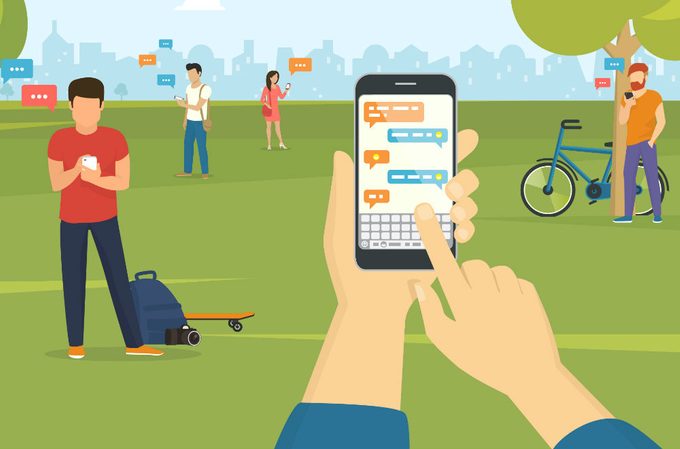What You Need to Know About Your Phone Addiction
Tech stress got you feeling unplugged? You’re not alone.

It’s 7:30 a.m. on a Thursday, and Claire O’Connor is helping her seven-year-old daughter, Blaise, get ready for school—with one eye on her phone While the self-employed public relations consultant was asleep last night, she received more than 25 emails, and she’s anxious to check them.
“My business depends on clients being able to reach me when they need to,” she says. These days, “when they need to” is anytime at all.
Before her head hits the pillow tonight, O’Connor will field some 400 emails, 100 phone calls and 20 text messages. She takes little comfort in knowing that few of the messages demand urgent attention. That’s because she’ll have to sift through them all before determining which are important. Somehow she’ll try to find chunks of time to get some actual work done.
“I never really feel like I’m finished for the day,” O’Connor says. There’s always one more task, one more call, one more email. And no matter where she goes, her both her work phone and her personal phone are close by.
Like most responsible people, O’Connor grew up believing she had to finish her homework before she could go out to play. Now, for her and many of the rest of us, the homework never seems to end.
The problem with never-ending work hours
Surveys show that the average office worker sends and receives 108 emails a day—an onslaught of electronic clutter that can take hours to slog through.
Even when we manage to clear out the in-box and escape our desks, most of us are still reachable by cell phone or some other handheld device. Sure, these gadgets add convenience and fun to our lives, but there’s a price to be paid.
“Technology is allowing us to do things we’ve never been able to do, and it’s positively incredible,” says Edward M. Hallowell, MD, author of CrazyBusy. “The downsides are that it’s addictive and you can become tied to it in ways that are exhausting.”
There’s little evidence that the rapid pace of technological innovation has made life markedly more enjoyable. In fact, it may be doing the opposite.
According to 2012 research from University of Gothenburg in Sweden, people who always have their phones within reach are more likely to report mental health issues. And if you regularly use your computer or tablet at night, you’re more likely to feel stressed and develop sleeping problems.
“There’s a strong tendency for humans to do everything they are able to do,” says architect Richard Saul Wurman, author of Information Anxiety 2. Combine that compulsion with constant connectivity and the workday need never end.
For many people, wireless devices like cell phones and tablets are the main culprits. They just make it too easy to contact anyone, anytime. And with information always available online, you can keep clicking forever.
Complicating matters, says Wurman, is the explosion of what he calls noninformation—the Internet’s jumbled mass of raw data, which fuels anxiety because you can’t digest it all, yet feel compelled to keep trying.
Inevitably, this overload takes a toll on your work.
Does multi-tasking really work?
“Human beings can handle two simple, low-level cognitive tasks at once, like filing and listening to the radio,” says Dr. Hallowell. But a higher-level cognitive task (reading a report) takes dedicated brainpower to perform optimally. Adding even a simplistic activity (scanning the TV) diminishes the comprehension and recall of both.
Research shows that multitasking is just a series of constant microinterruptions and stop-starts, all of which tend to reduce mental and motor performance.
Humans are natural-born suckers for anything that lets us escape the tedium of work. And the wireless age has opened the floodgates of momentary distractions. The barrage of email, phone calls, text messages and social media provides a steady flow of interruptions we can tap—or that can tap us—at any given second.
Time to unplug
We’ve developed what Dr. Hallowell and his colleagues term pseudo-attention deficit disorder. Our brains are trained to constantly flit around the universe of messages and information, seeking brief hits of excitement. Grazing ceaselessly, we never dig too deeply before moving on to the next distraction.
So how do you reduce this toll? “You have to reconstruct the boundaries that technology has taken down,” says Dr. Hallowell.
O’Connor remembers when the boundaries were clear: “Years ago, I was forced to stop working at a point. It simply got too late to make more phone calls.”
Now, for a break, she hides behind a mountain, literally, at her Pennsylvania country house. “There’s no cellular signal out there,” she says. “If they ever put up a tower, I’ll probably sell the house.”
Source: Adapted from Reader’s Digest, January 2008




